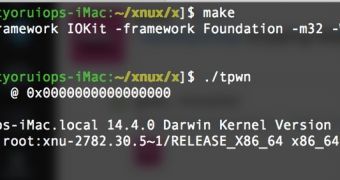We reported at the beginning of the month that there was a serious zero-day vulnerability in Apple's OS X 10.10 Yosemite operating system, allowing attackers to install malware and adware without the need for administrative privileges.
According to a new report, it would appear that Italian developer Luca Todesco has discovered a new zero-day vulnerability in the Mac OS X 10.10 Yosemite operating system, affecting all available updates, including the recently released 10.10.5.
With the OS X 10.10.5 update released earlier this week, Apple patched the DYLD_PRINT_TO_FILE privilege escalation exploit that allowed skilled hackers to install malware on target Macs.
The new zero-day exploit also lets attackers gain root access to the target Mac computer running either of the OS X 10.10, 10.10.1, 10.10.2, 10.10.3, 10.10.4, and 10.10.5 operating systems without using a password, according to Mr. Todesco.
It would appear that the new privilege escalation exploit discovered in Mac OS X 10.10 Yosemite relies on a succession of attacks, including a null pointer dereference in the I/O Kit open-source framework that lets developers write device drivers for Apple's OS X and iOS operating systems, for dropping a proof-of-concept payload into a root shell.
Apple is not yet aware of the security vulnerability
As Mr. Todesco hadn't reported the issue to Apple at the moment of writing this article, the Cupertino company is not aware of the zero-day vulnerability. However, it will soon find out and will most probably release one of those supplemental updates for OS X 10.10 Yosemite in the coming days.
Thanks to the new "rootless" security feature, Apple's upcoming OS X 10.11 El Capitan operating system is not affected by the aforementioned zero-day exploit. We will keep you informed on our dedicated Mac section if Apple patches the DYLD vulnerability in OS X 10.10 Yosemite, but until then, please be careful about who you allow around your Mac.
this is on 10.10.4 but 10.10.5 should't make a difference. pic.twitter.com/dFTiTcUm06
— Luca Todesco (@qwertyoruiop) August 15, 2015

 14 DAY TRIAL //
14 DAY TRIAL //